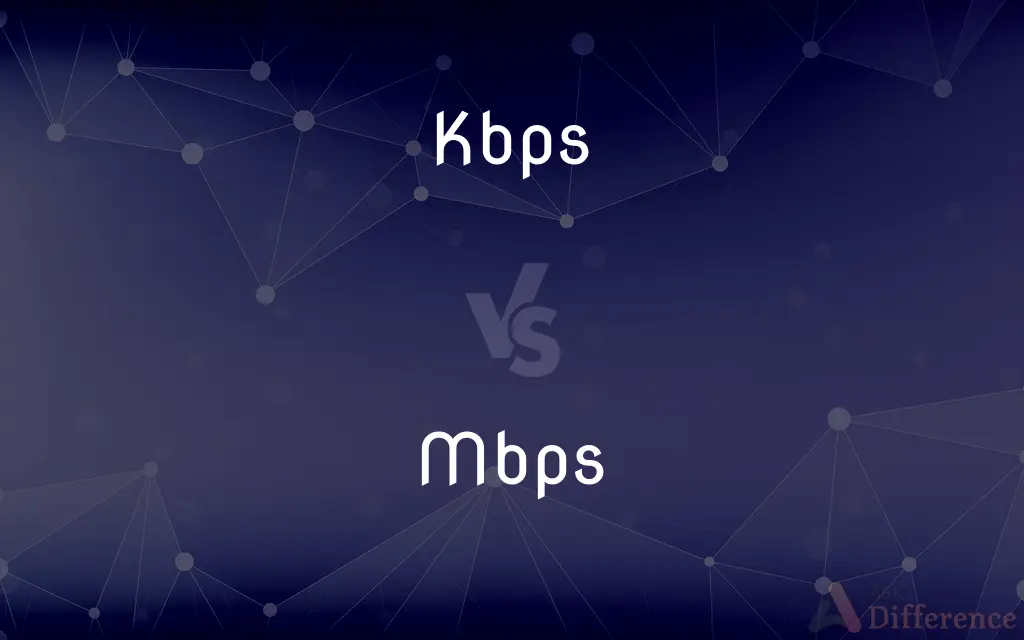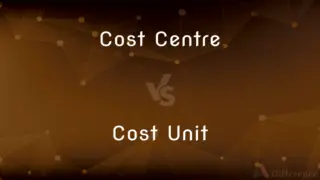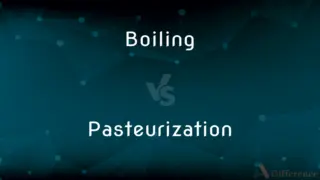Kbps vs. Mbps — What's the Difference?
By Tayyaba Rehman — Published on November 30, 2023
Kbps means Kilobits per second, a measure of data transfer speed. Mbps means Megabits per second, and 1 Mbps is equivalent to 1000 Kbps.

Difference Between Kbps and Mbps
Table of Contents
ADVERTISEMENT
Key Differences
Kbps and Mbps are both units of measurement for internet speed. Kbps stands for Kilobits per second, denoting a speed of a thousand bits per second. On the other hand, Mbps, or Megabits per second, represents a million bits every second, being significantly faster.
Utilizing Kbps or Mbps in describing internet speed depends on the context and technological era. Historically, internet speeds were often in Kbps due to early technology limitations, while in contemporary settings, Mbps are more common due to advancements in internet technology.
Kbps might still be used when talking about slower or restricted internet connections. Conversely, Mbps are ubiquitously mentioned in the modern, high-speed internet connection discussions, which is prevalent in numerous parts of the world.
In terms of file download, a file that takes a minute to download at 1 Mbps would take 1000 minutes in a 1 Kbps connection, showcasing a considerable discrepancy. In essence, it highlights the profound impact Mbps and Kbps have on user experience.
Comparison Chart
Full Form
Kilobits per second
Megabits per second
ADVERTISEMENT
Speed
1000 bits per second
1,000,000 bits per second
Relative Speed
Slower
Faster
Typical Usage
Older or slower tech
Modern, high-speed tech
Example
Dial-up speeds
Broadband speeds
Compare with Definitions
Kbps
Kbps might refer to either download or upload speeds.
The upload speed is capped at 100 Kbps on this network.
Mbps
Mbps is 1000 times larger than Kbps in measuring data transfer.
A 5 Mbps speed is notably faster than 5000 Kbps.
Kbps
Kbps is a unit indicating a thousand bits per second.
My dial-up internet runs at 56 Kbps.
Mbps
Mbps typically denotes speed in contemporary internet offerings.
The service upgrade shifted the speed from 10 Mbps to 20 Mbps.
Kbps
Kbps quantifies data transfer or internet speeds.
The slow video buffering is due to a 128 Kbps connection.
Mbps
Mbps can refer to the speed of both downloads and uploads.
The network assures 10 Mbps of both download and upload speeds.
Kbps
Kbps is often used in contexts discussing slower internet speeds.
The rural area still relies on a 256 Kbps internet connection.
Mbps
Mbps signifies data transfer speed of one million bits each second.
My broadband provides a blazing 100 Mbps speed.
Kbps
Kbps is smaller than Mbps by a factor of 1000.
The download speed of 200 Kbps is 15 times slower than 3 Mbps.
Mbps
Mbps is commonly used to describe broadband and fiber-optic speeds.
Fiber-optic connections can exceed speeds of 1000 Mbps.
Kbps
(computing) kilobits per second
Common Curiosities
What do Kbps and Mbps stand for?
Kbps: Kilobits per second; Mbps: Megabits per second.
Are Mbps commonly used to describe internet speed today?
Yes, Mbps is widely used today to describe broadband and fiber-optic speeds.
When might one see speeds in Kbps?
Kbps is often cited for slower, perhaps older, internet technologies.
Which is faster, Kbps or Mbps?
Mbps is faster; 1 Mbps equals 1000 Kbps.
Is a higher number of Kbps or Mbps indicative of faster speed?
Yes, higher numbers indicate faster speeds in both Kbps and Mbps.
Why might an internet plan mention both Kbps and Mbps?
To detail different aspects of the connection, e.g., download and upload speeds.
What speeds are typically sufficient for streaming HD video?
At least 5 Mbps is often recommended for HD streaming.
Can I measure my internet speed in either Kbps or Mbps?
Yes, internet speed can typically be measured in both units.
Can Kbps and Mbps refer to both download and upload speeds?
Yes, both Kbps and Mbps can refer to download and upload speeds.
Are both Kbps and Mbps used globally?
Yes, both units are recognized and used internationally.
Do Kbps and Mbps measure the same thing?
Yes, both measure data transfer speed, but Mbps is 1000 times larger than Kbps.
Are Kbps and Mbps the only units to describe data speed?
No, Gbps (Gigabits per second) also describes data speed, especially in very high-speed networks.
Can Kbps and Mbps be converted into each other?
Yes, 1 Mbps equals 1000 Kbps, and vice versa.
What's a common use case where Kbps might still be relevant?
Kbps might be cited for some cellular data services or in areas with limited internet infrastructure.
Why might an internet provider choose to advertise in Mbps?
Mbps are commonly associated with faster, modern connections and may be more marketable.
Share Your Discovery

Previous Comparison
Cost Centre vs. Cost Unit
Next Comparison
Boiling vs. PasteurizationAuthor Spotlight
Written by
Tayyaba RehmanTayyaba Rehman is a distinguished writer, currently serving as a primary contributor to askdifference.com. As a researcher in semantics and etymology, Tayyaba's passion for the complexity of languages and their distinctions has found a perfect home on the platform. Tayyaba delves into the intricacies of language, distinguishing between commonly confused words and phrases, thereby providing clarity for readers worldwide.













































